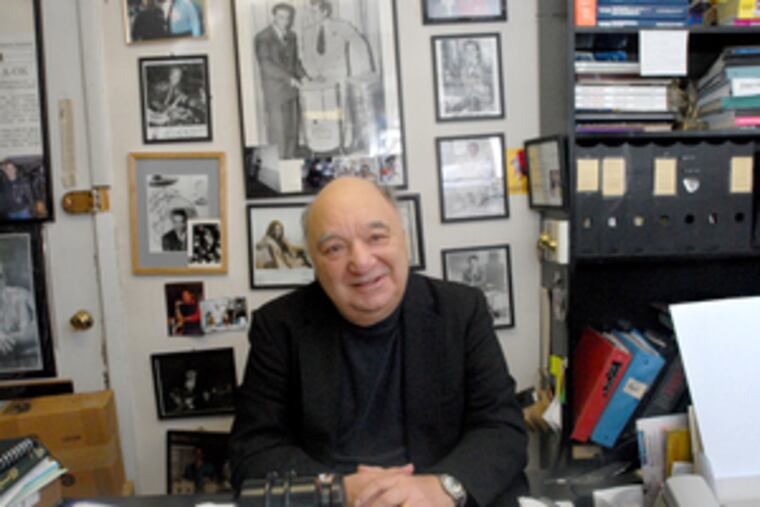Daniel Rubin | Heartbeat and drumbeat are one and the same for Sam D'Amico
The car stops halfway down Moyamensing and Sam D'Amico steps out, a broad man in a long coat, his dark round cap covering a bald pate.

The car stops halfway down Moyamensing and Sam D'Amico steps out, a broad man in a long coat, his dark round cap covering a bald pate.
"I don't like the way that looks in the window," he says, first thing, as he walks into his store of 33 years, Sam D'Amico Music Center.
His longtime assistant, Damian Montecarlo, nods, and starts thinking about rearranging the drum rims on display.
There's little left to sell, but Sam's on it anyway. The plan is to move the last of the drum sets, cymbals and sticks by the end of the year, shutter the shop and get on with the next chapter. Sam is 75 and still feels like a kid, except that his body hasn't gotten the message.
He ushers his guest into his cramped office in the back that is wall-to-wall memories of a life of keeping time. There are photos of drummers from the big band, jazz and rock eras, Desi Arnaz to Vinny Appice.
"It all started in 1942," he says, cueing his story without prompting, because he's got only so much time and a couple of people to thank.
"That's when I wanted to be a drummer. I was 10 years old. I had a wonderful uncle. He was a barber and off Mondays, and he used to take me to the Earle Theatre on Market Street. I fell in love with the drums when I saw Gene Krupa."
Pounding inspiration
Behind him is a publicity still of Krupa from 1937. Sweat soaks through the showman's double-breasted jacket and plasters his hair across his forehead. Krupa, in midsolo, looks ecstatic.
At the time, Sam lived with his mother and grandparents at 15th and Wharton. His father had died when the boy was 2. There was no money.
"I went up to my mother and I said I'd like to play drums. She told me we couldn't afford it. But I kept at her." An aunt paid for the $1 weekly lesson and drum rental.
Sam tells of coming home from the first session. "The boys were playing baseball. But I had found my true love, drums . . . "
He falls silent, dabbing the tears. "I'll be all right," he says. He moves to a story from seventh grade.
"One day this nun, this wonderful nun at St. Rita's, told me to take a note home to my mother." He'd written a composition about what he wanted to do with his life. The nun, who was called Sister Anthony, told Sam's mother she'd never seen a boy so committed to something.
The next day the nun took Sam aside and warned him that a musician's life could be hard. "Promise me," she said, "you'll get to really know your drums. Promise me that you'll be a gentleman."
"I said, 'Yes, Sister.' It took years to know what she meant about being a gentleman."
Here, he fast-forwards, past playing in jazz bands, dropping out of business college, arguing with his mother about studying drums.
A fork in the road
Instead, he took the more-traveled route and for years held a job in sales so unpleasant he doesn't want to discuss it. He taught some, played gigs on the side.
But he was married with a young daughter and a son on the way. "My wife came up to me and said, 'You are a wonderful person, but the only time I see you really happy is when you're put on a tuxedo and play music. In a few years I'll go back to work. You need to get back to music full-time.' "
That changed his life. Within six weeks he had 40 to 50 students a week. He turned part of their Packer Park home into a studio and office, made some extra money finding equipment for his students.
For the next decade he taught and played 80 hours a week. That's when he heard his wife's voice once more: "You're getting older. How long you think you can keep this up?" Forever, he said. She knew better.
That, basically, is how he came to open the shop on Moyamensing and create a sort of raucous musical clubhouse.
Sam D'Amico's is where you went when your pedal stuck, or your snare buzzed. Where someone would spent 20 minutes on your $20 purchase. Where you went to talk with people as mad about music as you were.
"The foundation of drumming in Philadelphia," says Sal Spera, a jazz drummer who has been dropping by for 30 years. "Treated you like family. I'd send players from out of town there for equipment, and they'd say, 'I went in there to get a price quote and he started offering me fruit from the refrigerator.' "
This time last year, Sam's assistant said he wanted to move to New York. Out of respect, he gave Sam a year's notice. Sam knew he was done.
Retirement will bring time for Rita, his wife of 51 years, time for Julian, his 9-year-old grandson, who is showing some interest in the drums. Sam's going to rehab his right hand, which lost some strength during a recent stroke.
"You'll clean up my words, make me sound good?" he said, and with that, excused himself, and went for his hat and coat. A lunch appointment awaited, with a friend from the old neighborhood.